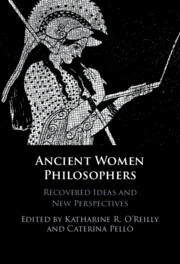Book contents
- Ancient Women Philosophers
- Ancient Women Philosophers
- Copyright page
- Dedication
- Contents
- Contributors
- Acknowledgements
- Abbreviations
- Introduction
- Chapter 1 Beyond Gender
- Chapter 2 Sulabhā and Indian Philosophy
- Chapter 3 Women’s Medical Knowledge in Antiquity
- Chapter 4 Ancient Women Epicureans and Their Anti-Hedonist Critics
- Chapter 5 Arete of Cyrene and the Role of Women in Philosophical Lineage
- Chapter 6 Women at the Crossroads
- Chapter 7 Pythagorean Women and the Domestic as a Philosophical Topic
- Chapter 8 Perictione, Mother of Metaphysics
- Chapter 9 Not Veiled in Silence
- Chapter 10 Women Philosophers and Ideals of Being a Woman in Neoplatonic Schools of Late Antiquity
- Chapter 11 Reappraising Ban Zhao
- Chapter 12 The Reception of Plato on Women
- References
- Index
Chapter 12 - The Reception of Plato on Women
Proclus, Averroes, Marinella
Published online by Cambridge University Press: 17 August 2023
- Ancient Women Philosophers
- Ancient Women Philosophers
- Copyright page
- Dedication
- Contents
- Contributors
- Acknowledgements
- Abbreviations
- Introduction
- Chapter 1 Beyond Gender
- Chapter 2 Sulabhā and Indian Philosophy
- Chapter 3 Women’s Medical Knowledge in Antiquity
- Chapter 4 Ancient Women Epicureans and Their Anti-Hedonist Critics
- Chapter 5 Arete of Cyrene and the Role of Women in Philosophical Lineage
- Chapter 6 Women at the Crossroads
- Chapter 7 Pythagorean Women and the Domestic as a Philosophical Topic
- Chapter 8 Perictione, Mother of Metaphysics
- Chapter 9 Not Veiled in Silence
- Chapter 10 Women Philosophers and Ideals of Being a Woman in Neoplatonic Schools of Late Antiquity
- Chapter 11 Reappraising Ban Zhao
- Chapter 12 The Reception of Plato on Women
- References
- Index
Summary
This chapter surveys reactions to Plato’s famous proposal in the Republic to allow women to engage in military action and political rule in his ideal city. After a methodological discussion relating this topic to the issues looked at in the volume as a whole, the chapter goes on to set out some of the interpretive debates concerning women in the Republic in modern-day secondary literature. It is then shown that interpreters from late antiquity to the Renaissance responded to some of the same concerns. For example, Proclus was at pains to reconcile the apparently contrary views on women found in the Republic and Timaeus. On the other hand, we find that in Proclus, Ibn Rushd (Averroes), and Lucrezia Marinella, wider concerns shaped reactions to Plato: for instance Ibn Rushd tries to fit the idea of potential virtue in women into an Aristotelian framework while Marinella offers a reading of Plato on women that brings him into conversation with the Renaissance ’querelle des femmes’.
- Type
- Chapter
- Information
- Ancient Women PhilosophersRecovered Ideas and New Perspectives, pp. 228 - 246Publisher: Cambridge University PressPrint publication year: 2023

